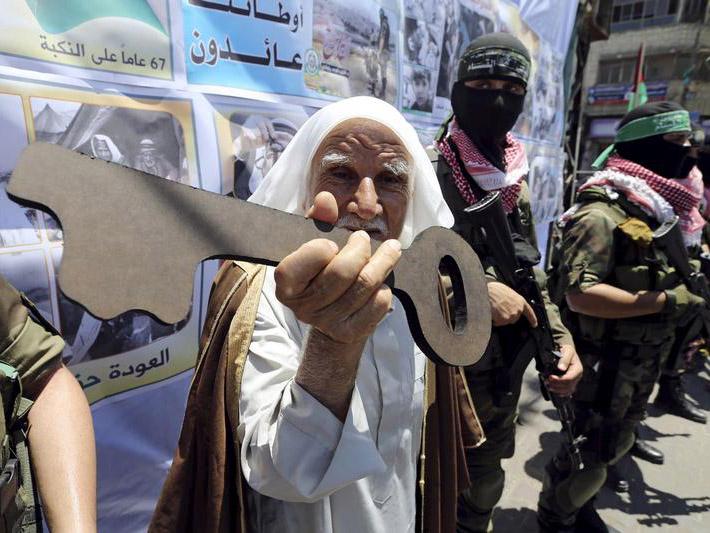Nakba Day: What is the annual ‘Day of Catastrophe’ observed by Palestinians?
Arabs displaced by the founding of the Israeli state commemorate the loss of land they consider their own every 15 May
Your support helps us to tell the story
From reproductive rights to climate change to Big Tech, The Independent is on the ground when the story is developing. Whether it's investigating the financials of Elon Musk's pro-Trump PAC or producing our latest documentary, 'The A Word', which shines a light on the American women fighting for reproductive rights, we know how important it is to parse out the facts from the messaging.
At such a critical moment in US history, we need reporters on the ground. Your donation allows us to keep sending journalists to speak to both sides of the story.
The Independent is trusted by Americans across the entire political spectrum. And unlike many other quality news outlets, we choose not to lock Americans out of our reporting and analysis with paywalls. We believe quality journalism should be available to everyone, paid for by those who can afford it.
Your support makes all the difference.Nakba Day is observed on 15 May every year and commemorates the displacement of Palestinians when the Israeli state was founded in the aftermath of the Second World War.
“Nakba” is the Arabic word for “catastrophe” or “disaster” and the occasion remembers the 700,000 Palestinians forced to flee as a result of the 1948 Arab-Israeli War and seek refuge in Jordan, Lebanon, Syria, the West Bank and the Gaza Strip, often without citizenship being granted.
The date was chosen to follow immediately after the Gregorian calendar date of Israeli Independence Day – 14 May 1948 – although, since Israel uses the Hebrew calendar to mark time, the days rarely align. The two anniversaries might be observed weeks apart or coincide on the same day, as they did in 2005. This year Israeli Independence Day occurred on 28 April.
Nakba Day commemorations typically take the form of rallies and speeches in cities around Israel, the West Bank and Gaza, with Palestinian marchers commonly brandishing placards, flags and house keys, the latter symbols of the homes and still-deserted villages their families have not been allowed to return to.
However, this year the rallies have been cancelled amid the coronavirus pandemic. Palestinian president Mahmoud Abbas has officially authorised digital activities to observe the anniversary, with many planning to join virtual reality tours and Zoom video chats.
This year’s is the 22nd since Palestinian Authority president Yasser Arafat inaugurated the day in 1998 in response to Israeli celebrations marking half a century of independence, but it had been unofficially commemorated as early as 1949.
Israel’s prime minister Benjamin Netanyahu, the country’s head of state then as he is today, commented at the time: “Israel was not responsible for the Palestinian tragedy, their leadership is.”
The demonstrations that took place on the first official Nakba Day escalated into violent clashes with Israeli security forces, for which each side blamed the other. Four Palestinians were killed and 71 injured.
Fighting broke out again in 2001 – when four Palestinians and one Israeli died – and in 2011, when 22 Palestinian marchers were gunned down on the Syrian border for attempting to enter Israeli territory.
A man was also killed in Gaza and as many as 125 injured as he tried to place a bomb along an Israeli patrol route.
In 2017, 11 were injured in Ramallah in the West Bank after Israeli soldiers responded with rubber bullets when protesters pelted them with stones. Stun grenades and tear gas also rained down in Bethlehem after rocks were thrown at Israeli troops guarding Rachel’s Tomb, a site sacred to both Jews and Muslims.
Prior to 1998, the Palestinian Liberation Organisation had avoided dwelling on the exodus and the rights of would-be returnees in favour of pressing for the ”liberation of Palestine” through armed revolution, a cause that saw them branded a terrorist organisation by Israel and the US until 1991.
Even use of the word “nakba” has proven a point of contention, with Israel’s education minister Gideon Saar ordering its removal from school textbooks aimed at young Arab children in 2009 on the grounds that it implies the catastrophe in question was the establishment of Israel, rather than the eviction of Palestinians.

For their part, the estimated 5.3m Palestinian refugees living outside of Israel maintain they were victims of ethnic cleansing during the 1948 conflict and insist on their right to return to territory they consider their homeland.
Israel refuses to meet the demand because doing so would compromise the Jewish nature of the state – defying Resolution 194 passed by the UN in 1948, siding with Palestinians on the issue.
When more than 2,500 people were killed in Gaza’s last war in 2014 and much of its infrastructure destroyed, locals branded the devastation “a second Nakba”, indicating just how fraught the term is and how controversial the day is likely to be once again in 2020, 72 years on from the birth of modern Israel.

Join our commenting forum
Join thought-provoking conversations, follow other Independent readers and see their replies
Comments